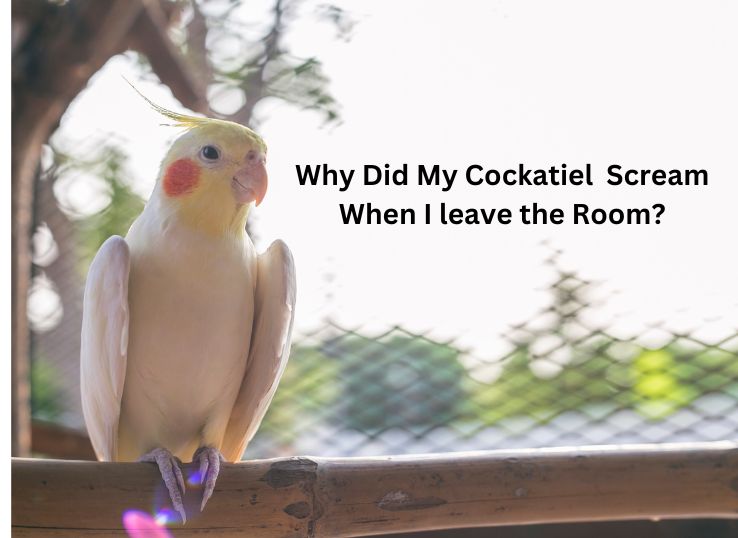Why Did My Cockatiel Scream When I Leave the Room? (Find Out)
Last Updated on March 11, 2024 by Ali Shahid
Cockatiels are highly sociable creatures that prefer not to be separated from their flock. When you step out of the room, your cockatiel might emit chirping sounds. This behavior serves as an attempt to communicate with you or express its longing for social interaction.
Cockatiels genuinely enjoy engaging with both humans and fellow feathered companions. If they are left alone for an extended period, they can become bored, lonely, and anxious, leading to loud vocalizations. Excessive chirping or signs of distress, when you leave, may indicate separation anxiety in your cockatiel.
In such situations, it is advisable to gradually introduce your bird to spending time alone by incrementally extending the duration of your absence. Additionally, offering toys and other forms of entertainment can help your bird feel more at ease when you are not present.
In this informative piece, we will explore the reasons behind your cockatiel’s noisy habits and guide managing them.

4 Reasons Why Your Cockatiel Screams When You Leave the Room
There are multiple reasons why your cockatiel may vocalize loudly when you depart from the room. Here are a few of the most prominent factors:
1. Separation Anxiety: Cockatiels are inherently social creatures that thrive on interactions with their human companions. When they find themselves alone for extended periods, they may experience separation anxiety, prompting them to emit screams in distress.
2. Boredom: Cockatiels are intelligent birds that require mental stimulation for their well-being. In the absence of toys or engaging activities within their enclosure, they may resort to screaming as a means of alleviating boredom.
3. Hunger or Thirst: When your cockatiel feels hungry or thirsty, they may resort to screaming to capture your attention, signaling their need for sustenance.
4. Fear or Anxiety: If your cockatiel encounters something in their environment that triggers fear or anxiety, they may resort to screaming as a way to convey their distress and discomfort.
How to Deal with Your Cockatiel’s Screaming Habit?
If your cockatiel is exhibiting excessive screaming behavior, there are several steps you can take to help them achieve a sense of calm:
1. Identify the Cause: Begin by identifying the underlying reason for your cockatiel’s screams. Is it due to hunger, thirst, boredom, or anxiety? Once you pinpoint the cause, you can proceed with targeted solutions.
2. Ensure Food and Water: Ensure that your cockatiel always has access to food and water. If they are hungry or thirsty, addressing these basic needs can mitigate their tendency to scream for attention.
3. Provide Enrichment: Cockatiels thrive on mental stimulation. Equip their living space with an array of toys and activities to keep them engaged and occupied, especially during your absence.
4. Speak Calmly: When interacting with your cockatiel, use a soothing and gentle tone of voice, speaking at a lower volume. This approach can help reduce their anxiety and contribute to a calmer atmosphere.
5. Cage Cover: If excessive screaming persists, consider covering your cockatiel’s cage with a dark cloth, creating a cozy and secure environment. This can alleviate their anxiety and promote a quieter atmosphere.
6. Observe and Document: Keep a journal to record the circumstances surrounding your cockatiel’s screaming episodes. Note the time of day, specific days, activities, or stress-inducing situations. This record may help you discern patterns and the root causes of their distress.
7. Moderate Use of Cage Cover: Avoid keeping the cage covered for extended periods. This will communicate to your cockatiel that it’s a temporary measure, not a permanent solution. Gradually reduce the use of the cover as their behavior improves.
By following these steps, you can foster a more peaceful environment for your cockatiel and address the reasons behind their excessive screaming.
Conclusion
Cockatiels enjoy human and avian companionship naturally, making them highly sociable birds. When left alone for extended periods, they may develop anxiety and resort to screaming.
To address your cockatiel’s excessive screaming, take these steps: identify the root cause, ensure access to food and water, offer engaging toys and activities, speak soothingly, consider cage covering, employ observational skills, and remember that moderation is key.
By exercising patience and consistent effort, you can help your cockatiel feel at ease and serene when you step out of the room.

